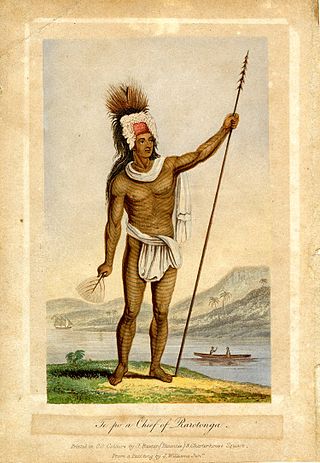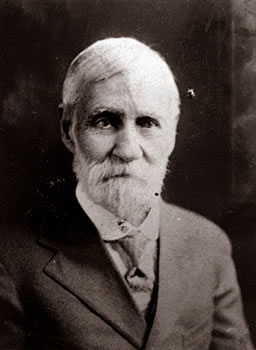Related Research Articles

The Cook Islands are named after Captain James Cook, who visited the islands in 1773 and 1777, although Spanish navigator Alvaro de Mendaña was the first European to reach the islands in 1595. The Cook Islands became aligned to the United Kingdom in 1890, largely because of the fear of British residents that France might occupy the islands as it already had Tahiti.

Niue is a self-governing island country in free association with New Zealand. It is situated in the South Pacific Ocean and is part of Polynesia, and predominantly inhabited by Polynesians. The island is commonly referred to as "The Rock", which comes from the traditional name "Rock of Polynesia".
The history of Niue is the history of the area and people of Niue, including its indigenous Polynesian societies. Niue was first settled by Polynesian sailors from Samoa in around 900 AD. Further settlers arrived from Tonga in the 16th century.

John Williams was an English missionary, active in the South Pacific.

Mititaiagimene Young Vivian is a Niuean politician and diplomat, who served as Premier of Niue twice, the first time from December 1992 to March 1993 following the death of Sir Robert Rex, and the second from 2002 to 2008. He also served as a Cabinet Minister multiple times, first as Minister of Education, Economic Development and Agriculture and later as Minister of Finance under Robert Rex, and in the Cabinet of Sani Lakatani. From 1979 to 1982 he served as Secretary-General of the South Pacific Commission.
Niuean is a Polynesian language, belonging to the Malayo-Polynesian subgroup of the Austronesian languages. It is most closely related to Tongan and slightly more distantly to other Polynesian languages such as Māori, Samoan, and Hawaiian. Together, Tongan and Niuean form the Tongic subgroup of the Polynesian languages. Niuean also has a number of influences from Samoan and Eastern Polynesian languages.
The music of Niue has a long history. Niue is a Polynesian island in the South Pacific. Though independent, it is in free association with New Zealand.

European exploration and settlement of Oceania began in the 16th century, starting with the Spanish (Castilian) landings and shipwrecks in the Mariana Islands, east of the Philippines. This was followed by the Portuguese landing and settling temporarily in some of the Caroline Islands and Papua New Guinea. Several Spanish landings in the Caroline Islands and New Guinea came after. Subsequent rivalry between European colonial powers, trade opportunities and Christian missions drove further European exploration and eventual settlement. After the 17th century Dutch landings in New Zealand and Australia, with no settlement in these lands, the British became the dominant colonial power in the region, establishing settler colonies in what would become Australia and New Zealand, both of which now have majority European-descended populations. States including New Caledonia (Caldoche), Hawaii, French Polynesia, and Norfolk Island also have considerable European populations. Europeans remain a primary ethnic group in much of Oceania, both numerically and economically.

The London Missionary Society was an interdenominational evangelical missionary society formed in England in 1795 at the instigation of Welsh Congregationalist minister Edward Williams. It was largely Reformed in outlook, with Congregational missions in Oceania, Africa, and the Americas, although there were also Presbyterians, Methodists, Baptists, and various other Protestants involved. It now forms part of the Council for World Mission.

Mutalau is one of the fourteen villages of Niue. Its population at the 2022 census was 77, down from 98 in 2017.
The Congregational Christian Church of Niue is a Christian denomination in Niue and New Zealand. It is rooted in the Congregationalist part of the Reformed tradition. It is the largest religious denomination in Niue, claiming approximately 75% of Niue's population as members.

Avatele, formerly known as Oneonepata Matavaihala, is one of the fourteen villages of Niue, located on the southwest coast, with a population of 128 residents as of 2022.

The following outline is provided as an overview of and topical guide to Niue:
Bill Vakaafi Motufoou is a Niuean politician and former Cabinet Minister.
The Niue Star is a monthly Niuean newspaper, founded on 11 June 1993. It is Niue's only newspaper. Its founder, owner, editor, journalist and photographer is and has always been Michael Jackson. The newspaper is distributed in Niue, New Zealand and previously Australia, and had a circulation of 800 in 2005, which had dropped to 200 by the time of its 30th anniversary in 2023. It is a bilingual newspaper, published both in English and in Niuean. In 2023, about a quarter of its content was written in English and about three quarters in Niuean.

Lesbian, gay, bisexual, and transgender (LGBT) people in Niue face legal challenges not experienced by non-LGBT residents. Male same-sex sexual activity is illegal in Niue, although there is no recent instance of it being actively prosecuted. Same-sex couples and households headed by same-sex couples are not eligible for the same legal protections available to opposite-sex married couples.
The Congregational Christian Church Samoa (CCCS) is an international evangelical Christian Church originally established in Samoa by missionaries of the London Missionary Society.

Merritt Gardner Kellogg was a Seventh-day Adventist (SDA) carpenter, missionary, pastor and doctor who worked in Northern California, the South Pacific, and Australia. He designed and built several medical facilities. Kellogg was involved in the controversy about which day should be observed as the Sabbath on Tonga, which lies east of the 180° meridian but west of the International Date Line. He was the brother of John Harvey Kellogg.
Niuean mythology relates to some of the myths prevalent on the island of Niue, an Oceanic island country in free association with New Zealand. Although Niuean mythology reports a colonization before 500 AD, the island was settled by Polynesians from Samoa around 900 AD. The five principal gods of Niue are known as the tupua, and include Fao, Huanaki, Fakahoko, Laga-iki, and Lagi-atea, who by various accounts, arrived from Fonuagalo, Tulia, Toga-liulu, or perhaps other islands. In Avatele myths, the gods are said to have come from within the earth instead of Fonuagalo. There are also many other gods in Niuean mythology from fish gods to flying rats.
Tahafa Pope Talagi was a Niuean politician. He served as a member of the Assembly from 1975 until his death.
References
- ↑ "Pacific Regional Statistics - Secretariat of the Pacific Community" (PDF). Spc.int. Archived from the original (PDF) on 24 November 2007. Retrieved 9 September 2017.
- ↑ An Interperation of Early European Contact with Niue, Sue McLachlan
- ↑ Niue : The Island and Its People, S. Percy Smith (1983)
- ↑ Anthoni, Dr J Floor. "History of Niue". Seafriends.org.nz. Retrieved 9 September 2017.